What did we learn from the Rugby Championship?
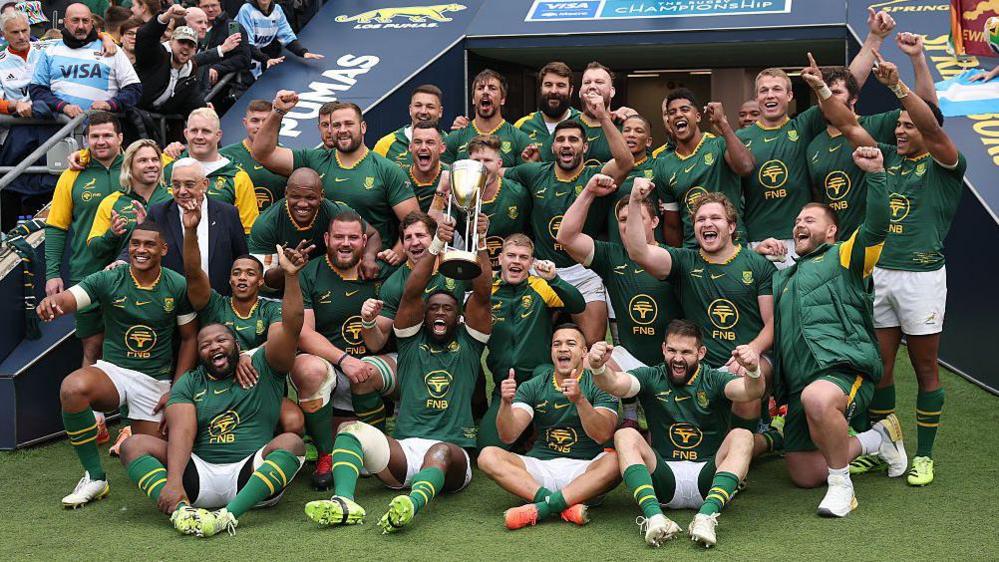
South Africa won the Rugby Championship on points difference
- Published
The southern hemisphere sides have wrapped up the Rugby Championship for another year.
South Africa defeated Argentina at Allianz Stadium in London on Saturday to claim back-to-back titles for the first time.
It was a thrilling tournament that had all four sides on two wins from the opening four rounds.
What have we learned about all four teams before they head to the northern hemisphere in November?
Pumas show promise but fail to push on
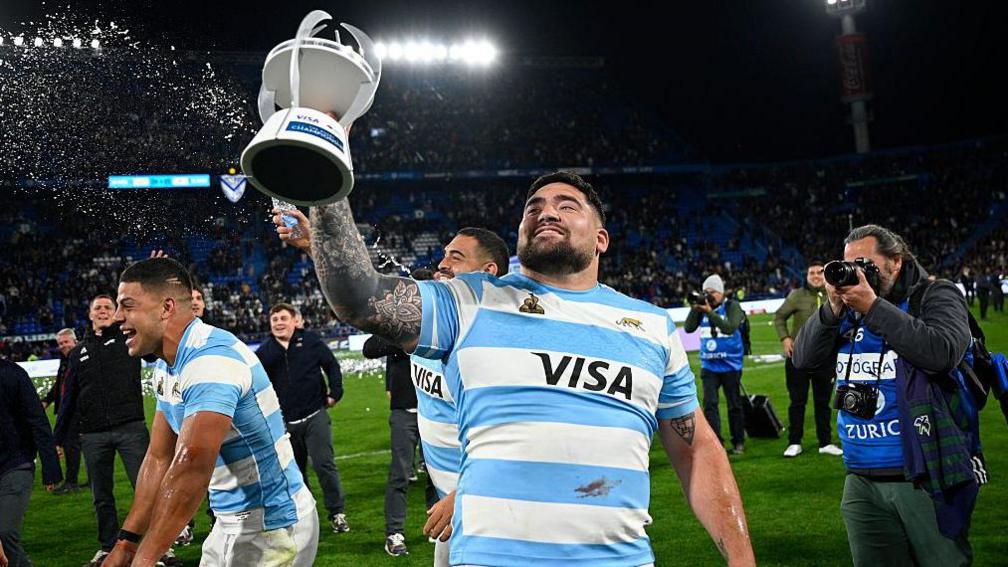
Argentina finished bottom for the first time since 2022
Two wins from six will be considered a disappointment for an Argentina side who defeated all three of their opponents for the first time in last year's Rugby Championship.
This year the Pumas, who joined the competition in 2012, finished bottom of the table for the first time since 2022.
A first ever home victory over New Zealand in round two was the highlight for Felipe Contepomi's side.
However, squandering a 14-point lead against Australia in round three - which they put right the following week - will come as the biggest frustration as another victory would have helped them avoid finishing fourth.
Opting to play their final home game at Allianz Stadium will bring financial benefits, but London's large expat South African community handed the Springboks an advantage.
Losing a two-Test series against England in July had already put pressure on getting results this campaign.
And backing up a big result to have a realistic title charge still remains the next step for Argentina, who play an exciting and fast brand of rugby.
With a fixture list of Wales, Scotland and England in November this could still end up being a successful year.
Schmidt's Wallabies on rise
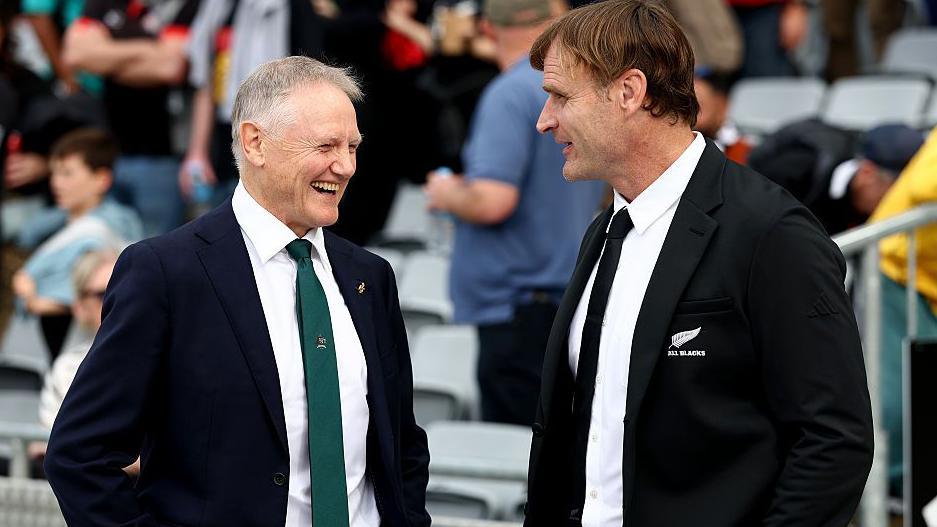
Joe Schmidt worked as an assistant coach for New Zealand at the last World Cup
Would the British and Irish Lions tour of Australia be competitive? That question has aged nicely for the improving Wallabies.
Joe Schmidt took over Australia at their lowest ebb after their failure to reach the knockout stages of a Rugby World Cup for the first time in 2023.
They had a much better showing at this year's Rugby Championship with wins over South Africa and Argentina allowing them to finish third - an improvement on two last-place finishes in succession.
Their campaign built towards a historic push to reclaim the Bledisloe Cup for the first time since 2002, with New Zealand coming into the final two fixtures against the Wallabies after a record defeat by South Africa.
However, Schmidt's side ended with two losses and he was unable to prise the Bledisloe from the All Blacks.
Even so, he hands an exciting squad to Les Kiss who is taking over as head coach next year.
"I do think there's growth in the team and I can't guarantee that's going to be linear but I can pretty much guarantee the effort's going to be there," he said.
Back-three star Max Jorgensen, 21, and centre Joseph Suaalii, 22, are game breakers and lethal attackers given space.
The availability of forwards Will Skelton and Rob Valetini could make the difference in tough autumn fixtures that include England, Ireland and France.
Robertson leans on veteran fly-half Barrett
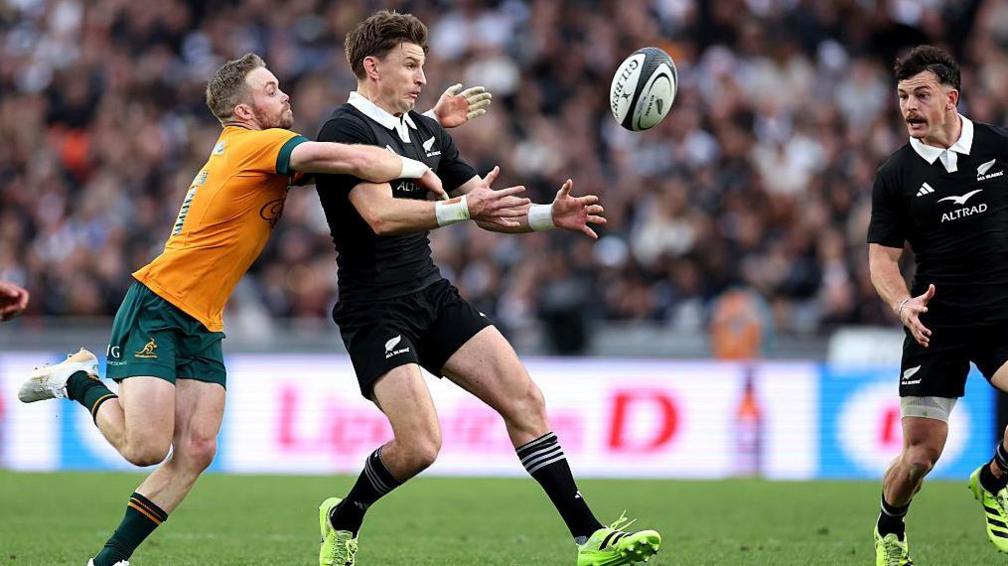
A shoulder injury ruled Beauden Barrett out of the final game of the Rugby Championship
Before Scott Robertson took the New Zealand head coach job, the All Blacks had won six of the past seven Rugby Championships.
For the second year in a row, Robertson's side came up short to South Africa.
A positive is that Robertson has used 43 players this year and still has fixtures to come against the four home nations in November.
Leroy Carter scored in his first three starts on the wing, with number eight Peter Lakai, 22, also getting a first start in the black jersey.
Robertson has started building important depth for the World Cup in 2027, while still beating Argentina, South Africa and Australia.
However, a first loss in Argentina and a shock record defeat by the Springboks proved costly for the All Blacks' title hopes and leave cause for concern.
Beauden Barrett, 34, started five of the six games at fly-half as Robertson moved away from last year's regular number 10 Damian McKenzie.
Richie Mo'unga started the World Cup final at fly-half two years ago and his return to New Zealand will offer another option.
Not many would have had Barrett, who has 142 caps, in pole position to start at the next World Cup, but he is showing no signs of slowing down just yet.
And he will have an electric half-back partner - if scrum-half Cam Roigard, 24, who looks ready to nail down a starting spot, can stay fit.
Erasmus develops talents and keeps winning
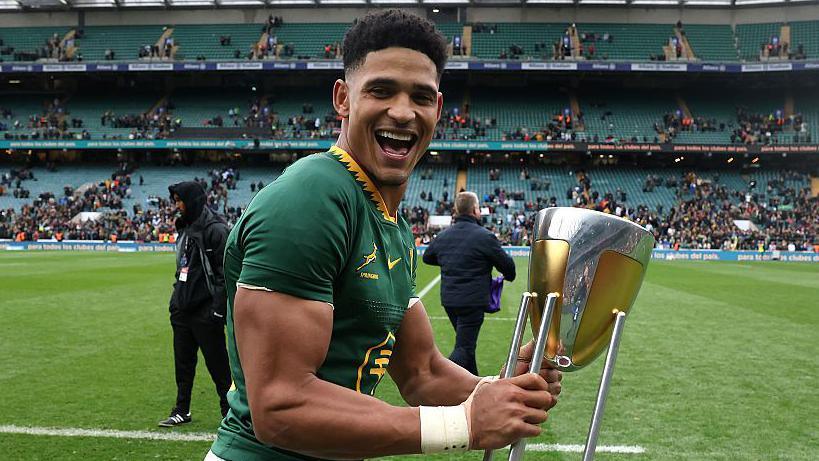
Sacha Feinberg-Mngomezulu plays his club rugby for URC side Stormers
South Africa dominated the men's dream team of the year at the World Rugby awards last year.
Having picked up back-to-back Rugby Championships, the world's number one-ranked team could be doing so again.
But what makes the achievement more remarkable is the amount of players head coach Rassie Erasmus has used.
"I think we used close to 47 players and I'd love to have given more chances," he said.
Defeats by Australia and New Zealand over the first three games put pressure on Erasmus - but subsequent results made clear the "risk" to develop talent was worth it.
Three wins from three games followed to secure the title, with 23-year-old Sacha Feinberg-Mngomezulu starting all of them.
A Springbok record 37 points against Argentina in Durban was the highlight as Feinberg-Mngomezulu developed as a potential frontrunner to start at fly-half in November.
Ethan Hooker, 22, began the final three games on the left wing and produced a standout performance against New Zealand, while Canan Moodie, also 23, started at outside centre in the final three games.
With the title on the line, Erasmus trusted his young stars and they delivered.
Selection will now heat up for the autumn as the Springboks' World Cup winners will hope to return to the side, especially for games against France and Ireland.
Erasmus once said he would "rather win the World Cup than sit at an 85% win rate".
Well, he has now built a squad that looks like it can do both.
"I think one of our goals is to stay in the present, do well, and not just focus on the World Cup," he added.
"But I think definitely trying to build squad depth played a role in the lack of continuity."